Accelerating digital development in Europe and Central Asia: On our way to Agenda 2030
International Telecommunication Union (ITU), with the contribution of the UN Digital Transformation Group for Europe and Central Asia
Session 233
Digital technologies and innovations traverse every sector of our economy and are inherent to our daily life. Information and communication technologies (ICTs) can help accelerate progress toward every single one of the 17 United Nations Sustainable Development Goals (SDGs). At the same time, it can also be the root of inequality and exclusion.
On our way to the High-Level Political Forum (2023) and the Summit of the Future (2024) with the Global Digital Compact, this moderated session will steer the tech community of Europe to reflect on where the regions stand today on inclusive digital development, and where the regions should be by 2030.
It will seek to understand what current efforts are put in place to advance the digital development scenario of the regions, how these mechanisms could be scaled up, and what policy actions are needed to boost the role of ICTs and digital for sustainable development. To do so, the roundtable will first share concrete examples of joint UN Agencies’ support to Member States in the field. Then, it will discuss the key priorities of the regions and related plans to continue the consistent development and deployment of an SDG-centric digital economy and society.
In line with this year’s WSIS Forum Focus, “WSIS Action Lines for building back better and accelerating the achievement of the SDGs”, the session’s outcomes will be considered during a roundtable discussion of the Regional Forum on Sustainable Development (RFSD) for Europe and Central Asia. This way, reinforcing the contribution of the WSIS Actions Lines to the SDGs process.
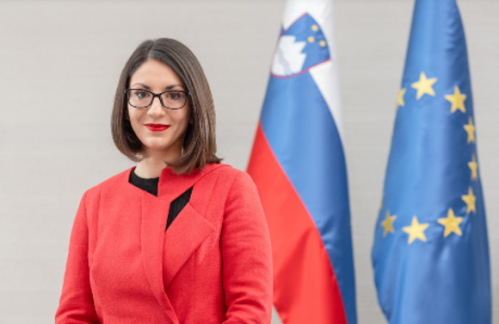
Dr Emilija Stojmenova Duh is the Minister of Digital Transformation of Slovenia. Prior to holding this position, she was the Executive Director of the Digital Innovation Hub Slovenia (2018-2019) and was the Director of RAZ:UM (2014-2016). She has coordinated several national and international research and development projects on the use of new digital technologies for innovation in and the development of cities, villages and communities. She has worked in several thematic groups of the European Commission on the topic of digital innovation hubs and rural development. She participates in an international team of researchers that has developed the SEROI+ methodology for measuring and monitoring the societal, economic and environmental return on investment of digital products and services. She has authored and co-authored a number of scientific and professional publications concerning digital transformation and is an Associate Professor for the Department of Information and Communication Technologies at the Faculty of Electrical Engineering at the University of Ljubljana. She was the first President of IEEE’s "Women in Engineering Slovenia". She is also the first Slovenian woman representative at the Global Young Academy and a member of the European Research Area Working Group within ALLEA – All European Academies. She completed her undergraduate and postgraduate studies at the Faculty of Electrical Engineering, Computer Science and Informatics of the University of Maribor.
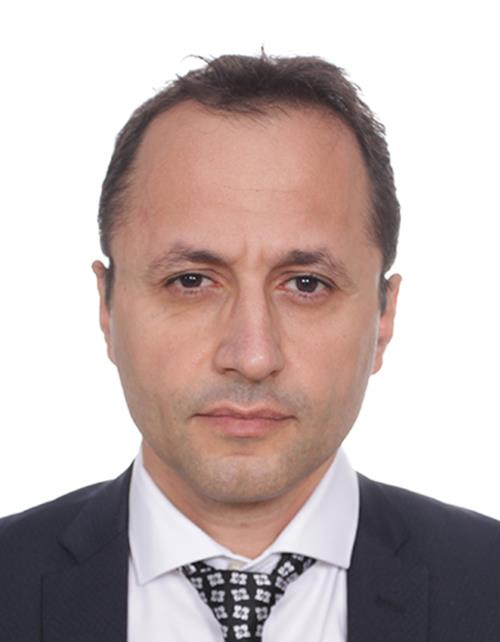
Igli Tafa is the General Director of the National Authority for Electronic Certification and Cyber Security of Albania (AKCESK) and National Coordinator for Cyber Security. He is a cyber security professional with a breadth of expertise developed through a diverse career supporting organizations in the private and public sectors. For the last nine years, he has engaged the security community in training, research, and information sharing to help protect against and manage cyber threats. He has built relationships with local governments and academic institutions nationwide to raise awareness of cyber security and how to manage it. He has advocated for a persistent and sustained approach to cyber security and has been involved in many large-scale domestic and international projects. Before joining AKCESK, Igli Tafa held various related roles in risk assessment, security systems engineering, application layer security, and incident response. He has a Ph.D. in Virtualization Systems in Computer Science from the Polytechnic University of Tirana and several industry credentials. Mr. Tafa's passion for fostering cybersecurity education has led to his continued success. His mission is to use his knowledge and experience to empower individuals, organizations, and governments to utilize secure practices as foundational building blocks for maintaining the digital economy.
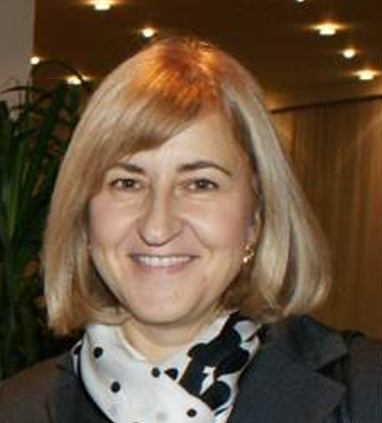
Meliha Kovačević is Head of Telecommunications licensing department at the Communications regulatory agency of Bosnia and Herzegovina (CRA). Since joining CRA in 2001, she has been dealing with various regulatory issues, including introduction of liberalization at the market, establishment of licensing regime, adoption and implementation of rules on consumer protection, as well as conduction of market analysis. Mrs. Kovacevic holds B.Sc. of Electrical engineering, from the University of Sarajevo.

Peter Mariën has worked in the context of International Partnerships for over 15 years and previously worked in banking and treasury. During his work with the European Commission, he was posted in Europe and in EU Delegations in Africa, Asia, the Pacific Islands, Latin America, and the Caribbean, where he occupied several positions as team leader. In September 2020, Mr. Mariën joined INTPA’s new Unit working on Science, Technology, Innovation, and Digitalisation, where he is the Teamleader for Digital Governance. He holds a master's in Business Economics and an EMLE in Law and Economics.

Andreas Schaffhauser is currently the acting director of the Federal Institute for Geology, Geophysics, Climatology and Meteorology of Austria (GeoSphere) and the Permanent Representative of Austria with World Meteorological Organization. GeoSphere Austria is based on the merger of the Central Institute for Meteorology and Geodynamics (ZAMG), founded in 1851, the national weather and earthquake service and the Geological Federal Institute (GBA), founded in 1849, as a geological service. In his previous position of head of the customer service division of the Austrian Central Institute for Meteorology and Geodynamics, Andreas was responsible for public weather services, climate- and environmental services, and commercial- and international activities. He managed Meteoalarm, an impact-orientated, common framework of authoritative warning information for meteorological and hydrological hazards of 37 NHMSs across the European domain from 2019 to 2021.
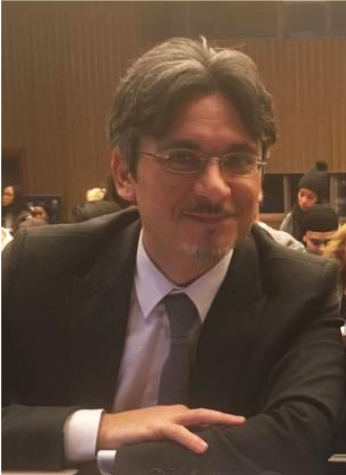
Alessandro Caforio is the Director of Research and Innovation at International Telematic University UNINETTUNO in Rome (Italy), where he coordinates the design and the management of research projects focused on innovation in programs and curricula, ICT technologies applied to teaching and learning processes, on social innovation and inclusive design. He is furthermore Professor for the "Digital Technologies and Cognitive Processes" and the “Psychotechnologies for learning processes” courses in UNINETTUNO University. He is a member of the “Innovation Expert Register” of the Italian Minister of Economic Development, and member of EMPOWER expert pools in “AI in Education”, “Course and Curriculm Design” and “Continuous Professional Development and SLPs” (https://empower.eadtu.eu/fields-of-expertise). He has been involved and managed European projects in the Lifelong Learning, Tempus, Creative Europe, Horizon 2020 and Erasmus+ programmes; currenlty is Project Director of "GreenSCENT - Smart Citizen Education for a Green Future" project, funded by European Commission under the Horizon 2020 programme.
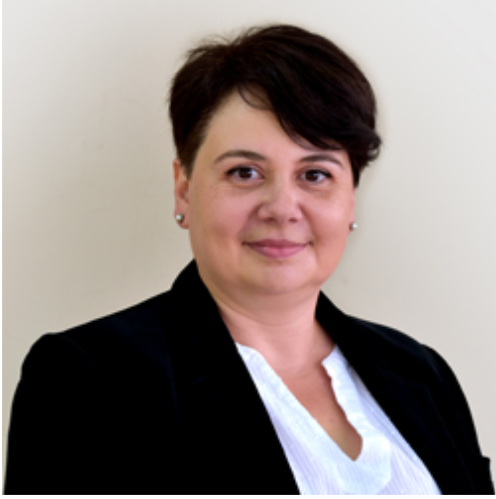
Inga Rimkeviciene works at the national communications regulator for more than 15 years. She participated in several EU projects in the field of electronic communications, member of Standardization Technical Committee on Electromagnetic Compatibility (TK 8). Since 2018, Member of Lithuanian delegation at the main ITU events, including the ITU Plenipotentiary Conference (Dubai, 2018), ITU Council, GSR, other. Since 2019, Chair of the Steering Committee of ITU Europe Centres of Excellence. Since May 2020, the Chair of the CEPT Project Team on preparation to the WTDC-21 and the main coordinator of preparations of Europe for the WTDC. Active participant of the Network of Women (NoW) for Europe Region, member of the Advisory Board of the Network of Women for WTDC (NoW4WTDC).

Slava joined the newly created Ministry of Digital Transformation of Ukraine (MDTU) in 2019 as the Head of eServices development. He is the architect of the highly popular digital app called ‘Government and I - DIIA` that is used by over 10 million Ukrainians. His current goal at the MDTU is to abolish the bureaucracy in Ukraine by delivering all government services by 2024 with just a few clicks – from filing tax returns to marriages to registering a company remotely. Prior to joining the MDTU, Slava was a successful digital marketing entrepreneur.

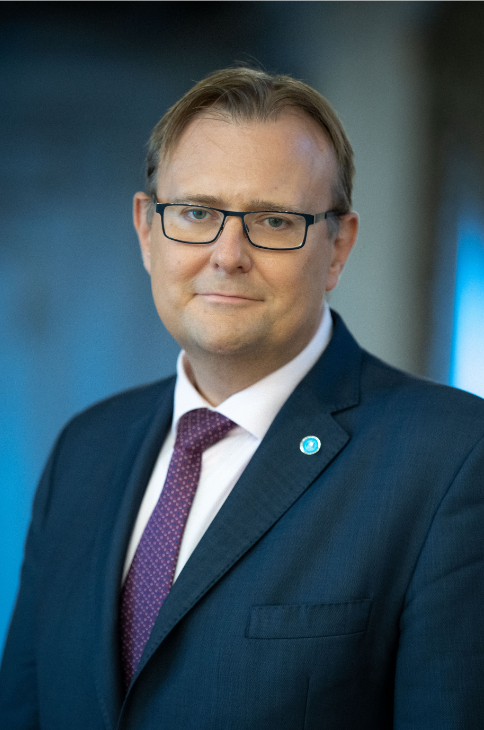
Mr. Jaroslaw K. Ponder, is the Head of the Office for Europe at the International Telecommunication Union (ITU), representing ITU in Europe and directing actions, projects, initiatives and experts’ groups targeting 46 countries of the Europe Region. His portfolio includes Regional Initiatives for Europe, designed by the European Member States and focusing on the ICT Infrastructure, Digitization, Digital Inclusion, Accessibility, Innovation and Cybersecurity.
Mr. Ponder has managed numerous projects, activities and initiatives at national, regional and international levels. He has taken lead roles in many international conferences and summits concerning ICT innovation and development of ICT ecosystem, information society, and advancements of digital economy worldwide, while setting strategies and ensuring their timely implementation. During his professional career, Mr. Ponder has held official positions in the public sector and has been a leading contributor to legislative projects, which influenced public policy. Mr. Ponder has working for ITU since 2004 holding diverse positions in the General Secretariat, Telecommunication Development Bureau, and Regional Presence, addressing the complexity of information society development and digital transformation at national, regional, international level, including United Nations level. Mr. Ponder was appointed Head of ITU Office for Europe in 2017.
For several years, Mr. Ponder has managed ITU’s work in the United Nations World Summit on the Information Society (WSIS) process, establishing the annual WSIS Forum, WSIS Prizes, WSIS Stocktaking, and others. In his current role, Mr. Ponder has established several formal coordination mechanisms facilitating the work of UN agencies in advancing digital transformation at the national and regional level.
.jpg?maxwidth=500)
At the Europe Office of the ITU, Sarah is in charge of the UN Affairs and UN Partnerships, digital inclusion, child online protection, and green digital issues. In addition to managing projects supporting Member States in these areas, her responsibilities include strengthening the cooperation between the ITU Office for Europe and the UN Sustainable Development System and EU structures on digital development and ICT projects to advance the Sustainable Development Goals (SDGs). She co-leads two regional UN working groups on digital transformation and serves as the Office's representative to the UN Country Teams in the Europe Region and to the UN in Brussels. She holds a master's degree from UNU-MERIT in Public Policy and Human Development as well as a bachelor's degree in communication and marketing. She has also received training in journalism.
-
 C1. The role of governments and all stakeholders in the promotion of ICTs for development
C1. The role of governments and all stakeholders in the promotion of ICTs for development
-
 C2. Information and communication infrastructure
C2. Information and communication infrastructure
-
 C3. Access to information and knowledge
C3. Access to information and knowledge
-
 C4. Capacity building
C4. Capacity building
-
 C5. Building confidence and security in use of ICTs
C5. Building confidence and security in use of ICTs
-
 C6. Enabling environment
C6. Enabling environment
-
 C7. ICT applications: benefits in all aspects of life — E-government
C7. ICT applications: benefits in all aspects of life — E-government
-
 C7. ICT applications: benefits in all aspects of life — E-business
C7. ICT applications: benefits in all aspects of life — E-business
-
 C7. ICT applications: benefits in all aspects of life — E-science
C7. ICT applications: benefits in all aspects of life — E-science
-
 C10. Ethical dimensions of the Information Society
C10. Ethical dimensions of the Information Society
-
 C11. International and regional cooperation
C11. International and regional cooperation
-
 Goal 4: Ensure inclusive and equitable quality education and promote lifelong learning opportunities for all
Goal 4: Ensure inclusive and equitable quality education and promote lifelong learning opportunities for all
-
 Goal 5: Achieve gender equality and empower all women and girls
Goal 5: Achieve gender equality and empower all women and girls
-
 Goal 8: Promote inclusive and sustainable economic growth, employment and decent work for all
Goal 8: Promote inclusive and sustainable economic growth, employment and decent work for all
-
 Goal 9: Build resilient infrastructure, promote sustainable industrialization and foster innovation
Goal 9: Build resilient infrastructure, promote sustainable industrialization and foster innovation
-
 Goal 10: Reduce inequality within and among countries
Goal 10: Reduce inequality within and among countries
-
 Goal 11: Make cities inclusive, safe, resilient and sustainable
Goal 11: Make cities inclusive, safe, resilient and sustainable
-
 Goal 17: Revitalize the global partnership for sustainable development
Goal 17: Revitalize the global partnership for sustainable development
ITU Office for Europe contribution to the UN System
- Webpage of ITU Office for Europe contribution to the UN System
Digital Development Country Profiles
The Country Profiles are developed by ITU together with UN Country Teams members. They address the countries' digital development status by applying a building-blocks framework that analyses digital transformation from various perspectives, enabling an understanding of how the various dimensions of digital development interact at the country level. The profiles also offer a broad overview of the activities and projects implemented nationally and in the wider region.
- Webpage of the Digital Development Country Profiles
- Digital Development Country Profile – Albania
- Digital Development Country Profile – Georgia
- Digital Development Country Profile – Moldova
- Digital Development Country Profile – North Macedonia
UN Digital Transformation Group for Europe and Central Asia
- Webpage of the UN Digital Transformation Group for Europe and Central Asia
- "UN Digital Development Toolbox: Guidelines, frameworks, and tools supporting the UN Development System delivery on digital in Europe and Central Asia": This living document was developed by the UN Digital Transformation Group for Europe and Central Asia under the leadership of the International Telecommunication Union (ITU). It lists the main United Nations frameworks, guidelines, capacity-building tools, toolkits, and other measurement tools related to Information and Communication Technologies (ICTs) and digital development. The purpose of this document is to provide a reference to the UN Development System in Europe and Central Asia to support their digital delivery.
- Regional Forum on Sustainable Development (RFSD) for Europe and Central Asia - Roundtable on SDG 9 and 17
Follow all updates on Twitter @ITUEurope